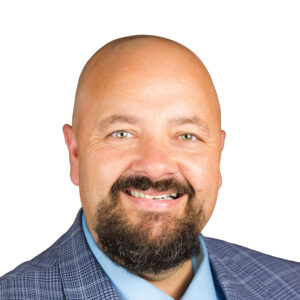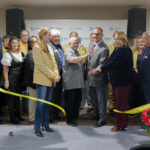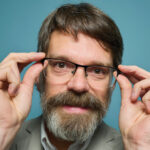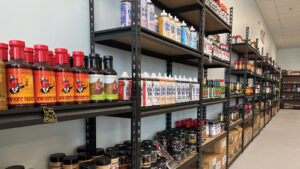I’ve found in my combined twenty years in leadership roles as a dean here at Columbia College and at a small university in Nebraska, a high school football and track coach in the St. Louis area and Nebraska, and as a small business owner that there is a guaranteed return on time spent developing relationships with those you’re leading, and the culture of your organization is vital to its success.
I was curious how other new organization leaders in Columbia approached these efforts: Jill Schlude, chief of police for the Columbia Police Department; Randy Cole, CEO of Columbia Housing Authority; and Dawn Sullivan, head volleyball coach at the University of Missouri.
What did you want to accomplish in your first six months?
An eighteen-year veteran of the Columbia Police Department, Chief Schlude was well aware of the issues that needed to be tackled: recruitment and retention of police officers, increased training opportunities for officers, and maintaining the Commission on Accreditation of Law Enforcement Agencies accreditation.
Randy Cole knew the challenges he would face having previously been a partner of the Columbia Housing Authority (CHA): getting acquainted with his team, connecting with partners for CHA, and ensuring that CHA received the resources it needed.
Dawn Sullivan’s priorities were finding the right coaches and support staff who “shared my values, but were different people,” ensuring she had “the right people” on her roster, and getting players to talk about “who they are as a team and where they want to go” so a foundation could be developed.
What did you try to learn about stakeholders when you met with them?
Strengthening her current relationships and building new ones were priorities for Chief Schlude. She focused on her organization’s goals, how the goals intersected with CPD, and the team’s experience of interacting with CPD. Chief Schlude’s next step was to keep them involved with her and the command staff.
Cole’s initial meetings focused on, “What do you see as our strengths, weaknesses, and threats?” Cole is a big believer in “getting out and being seen” so that he can hear from frontline staff what’s going on and make sure the leadership team is aligned.
Coach Sullivan’s objective in initial meetings is “making them feel comfortable and know that I care.” She ensures that she comes away with an understanding of their value to our program and what they need so that they can find a way to work together with the realization that “you can only do so much at one time.”
What return on the investment do you get as a leader in the time building relationships with stakeholders?
The return that Chief Schlude sees is that “it allows hope and an idea of a path forward,” especially due to the issues that CPD is facing.
Cole’s return is “getting really in tune with the organization from a data standpoint and just feeling where people are at so that you can make good decisions and also get buy-in from people at all levels.”
Coach Sullivan’s return is to ensure that her support staff, coaches, and athletes feel valued.
“Taking time to get in a room with a whiteboard and have honest conversations with the players about what they valued and where they wanted to go with the program allowed us to establish our foundation: Love, Family. and Grit (LFG).”
What appeared to be some common themes in stakeholders’ thoughts on the organization?
Chief Schlude had been able to see the struggle of having so many officers and first-line supervisors who were young in their tenure and how overwhelmed the department was due to being short-staffed, which led to frustration. These themes showed Schlude that they needed to have cross-generational conversations and “get back to being a team instead of us versus them.”
The time Cole spent showed “how undeniably dedicated” each staff member was to CHA residents and the needs of the residents, and the ability to respond to crisis without much intervention at all. Improvements needed were “general teamwork and communication across the organization.”
“COVID was really hard on our organization working remotely; getting everyone back to the office and working across teams was a priority,” Cole said.
Unlike Schlude and Cole, Coach Sullivan was able to select her coaching staff and an opportunity to bring in a super-majority of new players to the program. Coach Sullivan’s initial meeting with the five remaining players from before she moved into the role focused on “this is who I am, but I want to know who you are and where you want to go.” Some common themes from those same conversations were “uncertainty and lack of trust.”
What advice would you give to individuals who are moving into new leadership roles?
“You have to recognize that it’s not about you, it’s about those you’re serving, and people feeling part of that vision,” says Chief Schlude. “You have to be realistic on timelines and that culture doesn’t change overnight.” Chief Schlude went on to advise, “It’s highly likely you’ll be chewed up and spit out in the process, but you have to focus on making the place better and enriching employees.”
Cole’s advice was “just doing the basic things of working hard, trying to always do it right, and knowing that you will eventually break through barriers in front of you if you keep putting in the effort.” Cole also discussed how it’s important to recognize that it takes all types to run an organization and when conflict arises, “it’s oftentimes just communication with different personalities.”
“You need to know who you are and realize that it’s okay to take some time to figure that out,” says Coach Sullivan. “Those you are leading need to feel valued and be part of the conversation on values and where we want to go.” Once those values are in place, “You need to ensure the decisions you make are value-based and driven by purpose while building others to lead.”

Jonathon Moberly, JD, MBA, dean of the Robert W. Plaster School of Business, Columbia College










